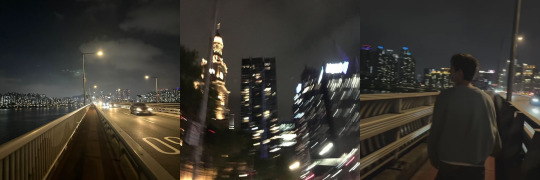#and like… new years in general. 2025 pls be good to me
Explore tagged Tumblr posts
Text
what do you mean I turn 21 next Saturday 😮💨
#TIME NEEDS TO STOP#TIMING#mentally I’m still 15#buuuuuuut I do have a lot to look forward to this coming week!!#I have a solid plan for my secret Santa that (I hope) my recipient will enjoy 🤭#anddd I got tickets to a football game the day after my birthday! got merch to prepare hehe#and like… new years in general. 2025 pls be good to me#bb’s rambles
11 notes
·
View notes
Text
guess who?
soft launching your boyfriend, joshua, on instagram (feat. seungkwan as your older brother)
notes .ᐟ smau (ig posts), random face claim, f!reader, use of y/n
a/n: a combination of some of my recent favourite tropes! i'm also exploring new and creative ways to write smaus and fics in general, thus the instagram feed layout. anyways hope you enjoy this short silly story! <3

urfavuser

urfavuser looking for someone
view all comments
dk_is_dokyeom WAIT WHATTTT
pledis_boos WHAT YOU ARE HERE???
urfavuser surprise 😛😛
user01 omg you went to support your brother! ♥︎ by author
urfavuser he better be grateful i dragged myself out the house for this
user02 Y/N IS A MENACE AND I LOVE HER FOR THAT

urfavuser

urfavuser midnight escape
view all comments
user01 ok queen 😩
sound_of_coups pledis_boos is looking for you girl
user02 WHO'S THAT IN THE 3RD PIC
user03 OH MY GOD RIGHT
user04 you might be onto something…

joshu_acoustic

joshu_acoustic late night walk
view all comments
user01 WAIT A MINUTE
user01 THIS LOOKS FAMILIAR
pledis_boos where even did yall go
joshu_acoustic for a walk obviously
min9yu_k why is seungkwan madder than sound_of_coups lmaooo
sound_of_coups i literally do NAWT care atp

urfavuser

urfavuser look who it is
view all comments
user01 SOFT LAUNCH WHOOO
user02 WE MANIFESTED THIS
user01 seungkwan about to go into his protective older brother era ♥︎ by author
user03 user01 WHY DID Y/N LIKE YOUR REPLY
vernonline 😦
user04 OH HE KNOWS THE TEA
urfavuser no he doesnt lol
pledis_boos ??? have i been summoned
urfavuser naw
user05 lies upon lies y/n WE KNOW

urfavuser

urfavuser watching the sunset with my sun
view all comments
user01 MAMA WHO THAT IN THE BACK
user02 PULLED A BADDIE
urfavuser *he pulled a baddie
user03 WE LOVE A SELF AWARE QUEEN ♥︎ by author
user04 hear me out, it's a seventeen member
user05 OMG RIGHT
user06 theres no way 😹😹 stay delusional gang
user07 user06 babes you must be fun at parties

urfavuser

urfavuser best of our recent dates
view all comments
user01 GUYS I SWEAR IT'S JOSHUA. JOSHUA LIKES BRACELETS. IT'S DEFINITELY JOSHUA. 100%.
user02 idk but he lowk might be jeonghan tho…?
user03 she's not dating a svt member lol
user04 user01 i can confirm i am the bracelet 😔
user05 user03 IM CRYING THEY THOUGHT THEY ATE 😭
sound_of_coups pffft lol
user06 omg hii cheol
user07 BRO HAS INSIDER INFORMATION
user08 what about you tell us cheol !? 😍🫶
xuminghao_o GET OUT OF MY TL 😭😭😭
urfavuser NEVERRR
xuminghao_o but what if my fingers... slipped... and i accidentally... tag him... oops...
urfavuser MINGHAO PLS NO
user09 minghao over here doing god's work 🙏🙏
urfavuser #cooked

urfavuser

urfavuser brother approves
view all comments
pledis_boos SIGHS DRAMATICALLY IN FULL CAPS
urfavuser ok weirdo 🥀🥀
pledis_boos LOOK WHO'S TALKIN
user01 i love whatever beef the boo siblings have together ♥︎ by author
urfavuser user01 well i don't really do actually (jokes)
pledis_boos me neither (not joking)
joshu_acoustic ❤️ ♥︎ by author
urfavuser ❤️
user02 DAMN BRO IS DOWN BAD
user03 OK YNSHUA CUTEST COUPLE
user04 POWER COUPLE WITH LETHAL FACE CARDS
user05 THIS WAS NOT ON MY 2025 BINGO LIST

joshu_acoustic

joshu_acoustic ❤️ loml
view all comments
urfavuser love ya shua darling ❤️❤️ ♥︎ by author
joshu_acoustic love you too ❤️
user01 right in front of my salad too
user02 make love like this attack me too one day 🥹
pledis_boos you better take GOOD care of my baby sister
joshu_acoustic 🫡
urfavuser pledis_boos I AM NOT YOUR BABY.
user03 COUPLE OF THE YEAR
user04 OMG OMG OMG I CALLED IT
user she is such a pick me girl for dating her brother's friend. i bet she is only dating him for attention.
user05 go cry about it loser 😂
user06 sorry you're just single and hate people for being HAPPY
user07 what about you go touch some grass ms delusional
user08 i heard people tend to be jealous over what they don't have 😔
saythename_17 best couple 😊
sound_of_coups 👏👏
min9yu_k ynshua 🤩
vernonline congrats dude
urfavuser 💕

kkumacoupzz 🐈 © 2025 do not repost any of my work and writing
#──★ ˙🦌 ̟ !! joshua#──★ ˙🍊 ̟ !! seungkwan#༘˙✧˖° ꒰ selle writes ꒱#seventeen#joshua#svt imagines#svt smau#joshua x you#joshua smau#seventeen x reader#seventeen x y/n#svt x reader#seventeen imagines#smau ꒰ 📲 ꒱ .ᐟ
409 notes
·
View notes
Text
2025 Firsts!
Tagged by @eemamminy-art ! Thank you for tagging meeee!
First bit of Arts and Crafts: Uhmm I'm counting the little calendars I made for my January goals LOL!
Since I want to prioritize getting in shape and improving my Korean, I wanted to choose a few things to try to do every day and make checklists, where the goal isn't really to do everything every single day or even really specific things but just to do more of these positive inputs. For the fitness one, there are checks for eating well, strength-adjacent workouts, and cardio-adjacent workouts; then for Korean there are checks for completing a structured lesson, speaking/writing practice, reading a short story, and of course the green owl.
First movie watched: I'm not much of a movie watcher so I tbh don't remember the last movie I watched like generally LOL! I thought about going to see Wicked and then simply didn't. I thought about watching the early 2000s Grinch movie and then simply didn't. you see my problem.
First song listened to: I'm pretty sure it was this:
Bc I remember actively thinking oooh what do I want to listen to to ring in the new year?? How about my most-listened-to song of 2024 LOL!
First TV show watched: I finished rewatching S1 of Squid Game so I'd be ready to watch S2 (haven't started yet not emotionally ready). Then just yesterday I started Cinderella at 2AM which so far is so cute it is physically hurting me (highest possible compliment).
First book read: Essential Concepts of Business for Lawyers LOL -- but tbh it's a very good read so far. Law school makes it so hard to have the energy to read for pleasure; I reeeeally need to make some time for it this year!
First fanfic read: Haven't read anything yet--I don't think I've even read any of my own lol! I'm still in a bit of a weird place where I don't feel like doing very much after my hell term, even things I usually like, so I'm being careful about what I force myself to do for my own good at this stage.
First dinner I had: I couldn't remember and then I realized, oh, I'm logging my meals rn LOL--I had some chicken fettucini with green onions and just a random side of broccoli bc Health but I also didn't want the broccoli disturbing the delicious carbs.
First food I ate: uhmmmmmm I slept in on Jan 1 so I had chicken tacos and veggies for lunch. The chicken tacos had avocado and also habanera sauce which I remember bc I might have been a lil heavy handed with it! Very tasty but it burned!!!
Let's seeeeeeeeee I shall tag @bgmoth @thevikingwoman @myreia @delirious-comfort @local-magpie annnnnnnnd anyone else who wants to do it pls feel free to tag me, I'm never sure who likes to be tagged in these kinds of things!
4 notes
·
View notes
Text
THE ROLE OF ZOOS IN CONSERVATION/EDUCATION
Zoos have an important role to play in the preservation of wild life and natural habitat and also in conservation and education. They are established to create awareness in regard to animals, wildlife and biodiversity as they make use of vast amount of land to either protect animals or reconnect humans to nature. Factors like greed, industrialization, pollution and loss of habitat are some of the major reasons why zoos are being established as a means of educating the general public about protecting, conserving and aiding animals in their natural environment.Animals can be kept in zoos to either protect them from poaching or extinction. Animals are kept in zoos for better understanding and research purposes but at the same time its best to leave them in their natural habitat. Zoos are make a lot of money from tourism which in turn produces revenue to keep up with the many activities they undertake. Zoos serve as a means of educating the public on the various environmental problems we face in our world today.
IS IT ETHICAL TO KEEP ANIMALS IN ZOOS
I think keeping animals in zoos is a good thing as long as they are taken care of properly and protected from predators and the danger of extinction. If animals were in the wild they would be at a higher risk of extinction. The most important thing for me is that the zoos replicate their natural habitat as much as possible. Very large animals should not be in zoos where their natural habitat cannot be replicated and its natural behaviour cannot be expressed. I think smaller animals such as monkeys can be kept in zoos because it is easier to take care of them and they can interact with the environment even with little space. The type of zoo should fit the category of animal. Animals facing extinction should be kept in zoos with limited access to the public to ensure they reach a sustainable population. Attached is a video that explains why need zoos.
youtube
Video Source: TedxTalks. Guest speaker: Gabriela Mastromonaco. Available from https://www.youtube.com/watch?v=VGBzwnTW-O4&frags=pl%2Cwn
VISITING ZOOS
I enjoy visiting the zoo occasionally during summer as it helps me gain a deeper connection to nature and just admire the beauty and uniqueness of nature. Also, I get to see and discover more species of animals which is very fun for me and informative.It’s also cool to hang out with animals
FOOD
What I like about my food system is that some food items i consume are organic. I try to reduce my consumption of canned foods. My food system is especially good because I help to support local farmers by buying fruits and vegetables directly from them and not from the grocery store. I also make sure i compost my organic waste. Examples of the food items I purchase regularly include: -Organic vegetables
-Strawberries
- Rice
- Pasta
- Pineapples
- Tomatoes
There aren’t a lot of things i dislike in my food system. Although i wish organic food could be more affordable and had a longer shelf life. I also have to deal with the fact that organic foods are not readily available.
OCEANS
My primary concerns about the oceans is the threat too marine life as a result of of human activities/actions. Specifically plastic pollution in our oceans
Plastic wraps our food, our houses, and our technology. It is a remarkable substance that has contributed to advances in healthcare and helped raise millions pf people out of poverty. But, disposable consumer goods end up – often after a single, fleeting use – in land-fills, littering our landscapes, and polluting our Ocean. 80% of marine plastic pollution originates from land-based sources.
Global plastics consumption is predicted to grow dramatically, to reach 400 million tonnes a year by 2025.
If the rate at which plastic debris enters the Ocean goes unchecked, it is possible that the Ocean could contain 1 kg of plastic for every 3 kg of fish by 2025, and more plastic than fish by 2050.
Micro-plastics coming from synthetic fabrics washed in washing machines is the most common form of micro-plastic in the ocean.
CONSEQUENCES OF PLASTIC POLLUTION
Plastic material does not biodegrade: Over time, plastic material does not bio-degrade, but breaks down into tiny particles known as micro plastics, which can be eaten by small marine animals and enter the food chain. Tiny particles of plastic even build up in fish brains, altering their behaviour.
Plastic waste contains toxic chemicals: Plastic debris often contains chemicals added during manufacture that can absorb and concentrate contaminants such as pesticides, heavy metals and persistent organic pollutants (e.g. poly-chlorinated biphenyls or PCBs).
Pollution is very difficult to deal with: Plastic pollution is extremely difficult to remove from the environment or trace back to its source.
Health impacts on humans: A growing body of scientific research and evidence suggests that these harmful substances can transfer into the tissue of aquatic species – such as fish – that are consumed by humans .
WHAT CAN BE DONE ABOUT IT
More effort is needed by governments to take leadership on environmental policy to cooperate and tackle this global scourge. Action is needed now, not ten years from now.
We must transition away from a linear (make, use, dispose) economy towards a circular economy where resources, such as plastics, are used, recovered and reused over and over again, instead of heading directly to the landfill or the Ocean.
We all also need to take personal responsibility and significantly limit our use of plastic. For example, we can carry a reusable water bottle or coffee cup, bring our own cloth bag or other reusable bag when shopping, buy second-hand products, dramatically cut down our consumption of single-use plastic such as food contained in plastic packaging or plastic straws in our take-away drinks, and make sure we recycle whenever possible.
All Governments should incorporate education about plastics, waste management and recycling into their school curriculum. This is a helpful strategy and public education efforts should be amplified. But they also need to go further, faster to encourage businesses to change and to also adopt procurement policies that reduce their plastic footprint.
youtube
Video source: https://www.youtube.com/watch?v=3CK_inDmuoU
WHAT DO I PLAN TO DO ABOUT IT
I will try to reduce the amount of plastic I use and encourage people to use less plastic. I will also look into better alternatives. I will sign multiple petitions advocating the ban of single-use straws.
REFERENCES
Our Team. MARINE PLASTIC POLLUTION – Ocean Unite. Ocean Unite https://www.oceanunite.org/issues/marine-plastic-pollution/
VATSALA SINGHANIA. 10 Pros And Cons Of Eating Organic Foods. STYLECRAZE. https://www.stylecraze.com/articles/pros-and-cons-of-eating-organic-foods/#gref
Definition of time poverty | New Word Suggestion | Collins Dictionary. Collinsdictionary.com https://www.collinsdictionary.com/submission/17594/time+poverty
8 Reasons that Zoos are Critically Important for Conservation – Dr. James Borrell. Dr. James Borrell. http://www.jamesborrell.com/8-reasons-that-zoos-are-critically-important-for-conservation/
The Role of Zoos in Endangered Species Conservation. ThoughtCo. https://www.thoughtco.com/zoos-and-endangered-species-conservation-1182068
Why We Need Zoos | Gabriela Mastromonaco | TEDxToronto. https://www.youtube.com/watch?v=VGBzwnTW-O4&frags=pl%2Cwn
A sea of plastic: Shocking images show how bottles, bags and rubbish are choking our oceans https://www.youtube.com/watch?v=3CK_inDmuoU
0 notes